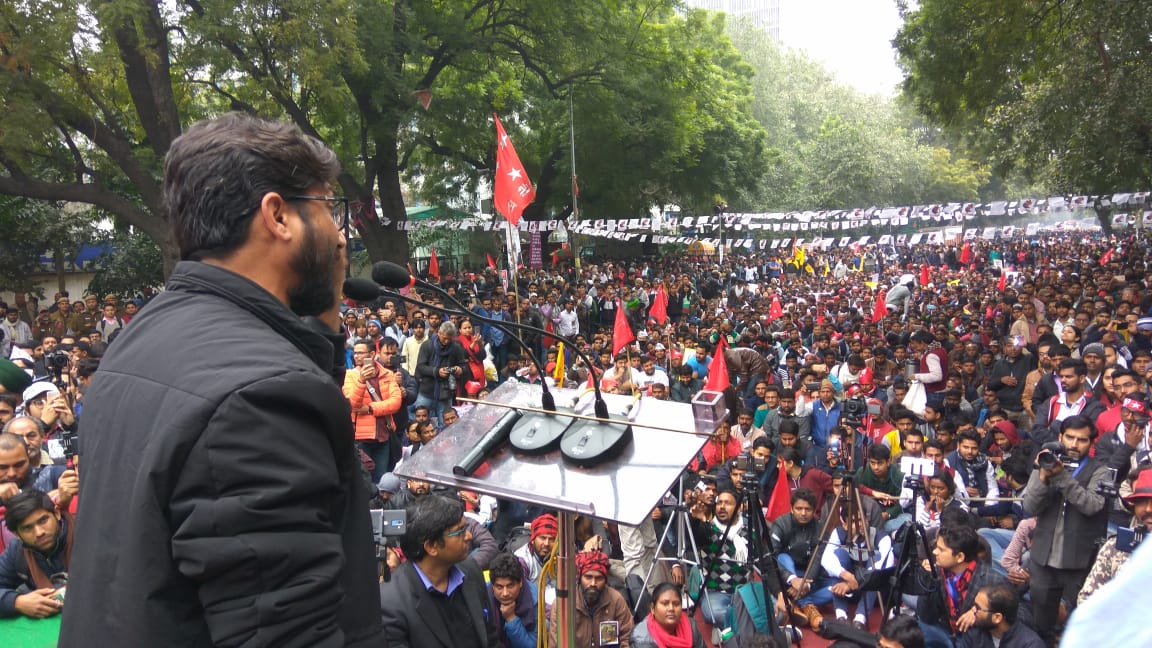New Delhi: Over 70 student and youth organisations came together on February 7 to take part in the Young India Adhikar March, walking from Red Fort to Parliament Street this morning. Spokespersons from the Samajawadi Party, the RLD, Swaraj Party and several other political parties also extended their support.
Students from all over India came to Delhi to register their protest – including from Banaras Hindu University, Jamia Millia Islamia, Aligarh Muslim University, FTII, Delhi University, Jawaharlal Nehru University, Punjab University, Revolutionary Youth Association, All India Railway Apprentice Association and many others. They all collectively opposed Modi government’s youth-related policies including the privatisation of universities and the lack of job opportunities.
The rally’s impressive turnout ensured its success but before that, the organisers, the Young India Adhikar March Committee, had to work around several bureaucratic hurdles to make sure that the march took place at all. All India Student Association’s president Sucheta De told LiveWire that the Delhi police initially denied them permission to march and kept asking them to withdraw their protest as late as the night before the march was set to take place.

MLA Jignesh Mewani addresses the crowd.
Even so, the march attracted thousands of students from across the nation.
Janmejaya Tiwari, convenor at Uttarakhand Chhatra Sangh, told LiveWire he was there with dozens of other students from the state because, “In Uttarakhand, BJP government turned government schools to shishu mandir and we had protested against the decision. They had also promised two crore jobs but did nothing in that direction.”
Aparna, from Banaras Hindu University said, “People have come here from across the country – from Kashmir to Hyderabad – to stand in solidarity with every student who either graduated from college or are currently studying. It is not just about employment, it is also about the saffronisation of educational institutions.”
Demands raised
The protesters released a charter of demands asking the government to immediately fill all vacant government positions, crack down on government-held exam papers being leaked and asked the government to recognise the right to dignified employment as a fundamental right. They also asked the government to provide unemployment allowances and guarantee reservations for socially deprived sections in the private sector as well.
With general elections right around the corner, civil society groups and other organisations have been setting forth their demands, reviewing the past five years and laying out what they want as citizens in the future.
“We are just 100 days away from the general elections. Whoever comes to power must fill 24 lakh vacant positions in public sector services and strengthen the NREGA scheme to ensure employment for all”, said Dalit rights activist and Gujarat MLA Jignesh Mewani.
Adding to this, Kanupriya, Panjab University’s first woman student body president said, “The reason why so many people in Punjab are settling abroad is because there are no jobs here. The government promised two crore jobs when it came to power but did nothing to fulfill that promise.”

Most posters poked fun at the Modi government, demanding jobs, not jumlas. Credit: Tanya Jha
The organisations also addressed how the present regime has scuttled campus democracy and privatised many publicly-funded institutions. They asked the government to spend at least 10% of the national GDP on education, stop fund-cuts and fee-hikes and waive-off all student loans unconditionally.
Talking about the repression of students’ freedom on campuses, Meera Sanghamitra from the National Alliance of People’s Movement said, “Students who were supposed to be studying in universities are out on streets because of this repressive regime. We don’t want sangh vidhaan (right wing ideologies) we want the samvidhaan (constitution). The government needs to protect our constitutional ethos, not the fugitives like (Vijay) Mallya who ran away with our money. We demand freedom of expression and democracy in all educational institutions.”
The organisations spoke at length about caste-based discrimination on college campuses and how the government is targeting minority institutions. They demanded the enactment of the Rohith Vemula Act to put an end to caste-based atrocities in universities.
One spokesperson from the Chhatra Yuva Sangharsh Samiti said, “From JMI to AMU, all minority institutions are under threat. Our friend Najeeb Ahmed went missing from JNU and Rohith Vemula had to commit suicide. This government only knows how to suppress the voices of muslims, Dalits and others who question the authority.”
Student organisations like All India Student’s Association and Pinjra Tod also spoke about gender-based discrimination on college campuses. They demanded the formation of effective anti-sexual harassment cells in universities and a nation-wide end to discriminatory hostel rules for women.
Referring to last year’s series of anti-hostel curfew protests, members from Pinjra Tod said, “From BHU, AMU, Jamia to Hyderabad and Mizoram, women have been fighting against the discriminatory hostel rules and other kinds of repression exercised by the administration. Not just Modi government but most governments in the past have been suppressing the marginal voices. We don’t want to be bharat matas, we just want the freedom to exercise our basic rights.”
Student groups from Assam and Nagaland also joined the march to demand scrapping of the Citizenship Amendment Bill (2016) and the public funding cuts for education.
As the day concluded, it seemed unclear whether the government will respond to any of these demands immediately or India’s youth will have to take their grievances to the polling booths in a few weeks.

